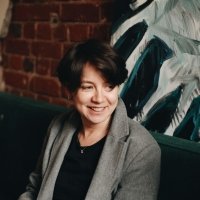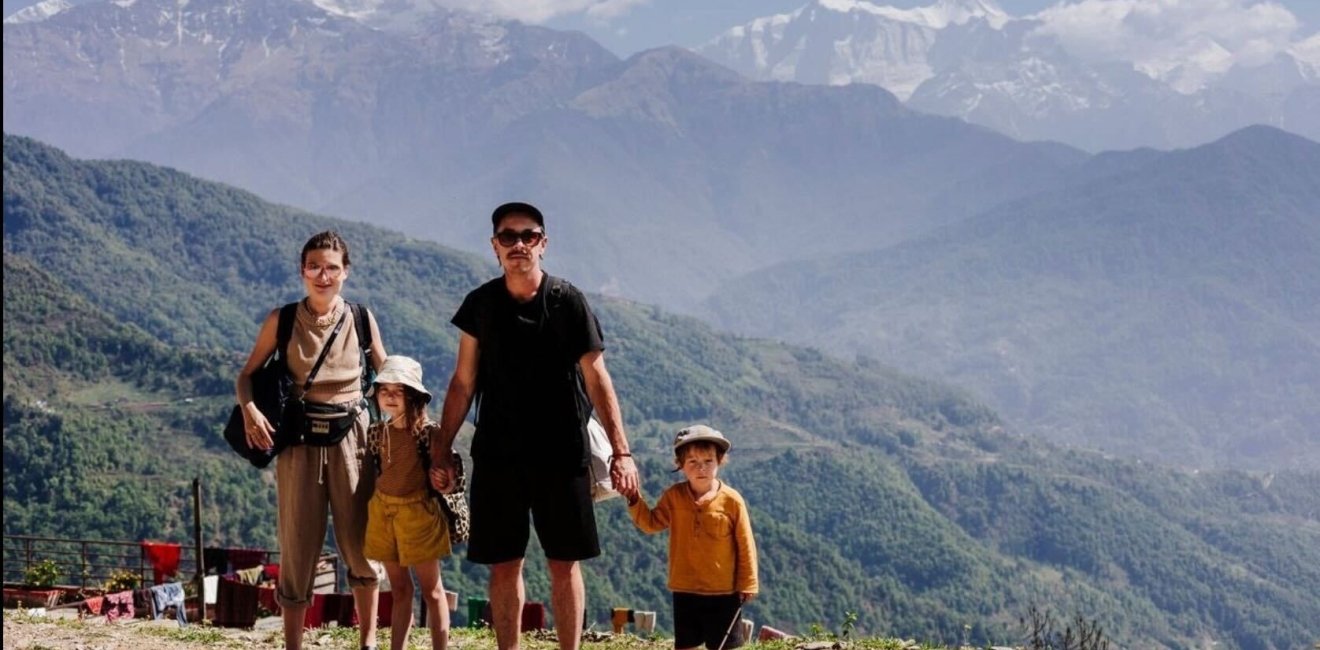
A blog of the Kennan Institute
BY EKATERINA KRONGAUZ
When Vika’s husband Mark told her on the evening of February 27—three days after Russia launched
its invasion of Ukraine—that their acquaintances were leaving Russia for Nepal, she got indignant.
“Why are you telling me this? We can't go anywhere right now. It's not for families like ours. We are
not privileged! We have no savings, we only have children and a mortgage. And no one will help us.”
A week later, Vika (35), a blogger, Mark (37), a photographer, and their children, Hannah (6), and
Joseph (3), landed in Kathmandu.
“We had been thinking about leaving Russia for several years, but it didn’t work out,” Vika tells me.
“We spent most of the pandemic in our small rented apartment in Moscow, and it was very hard. The
borders were closed. By the summer of 2021 we decided that we would buy an apartment in Moscow,
refurbish it, live in it for two years, and then rent it out. With this money we would rent something
somewhere else.”
That’s what they did. They took out a mortgage and started the renovations. The first contractor Vika
found took a large advance payment but by January of this year told her that he had run through all the
money, had nothing left to pay the workers, and wasn’t skilled enough to do the work himself. Vika
found another contractor, who estimated the repair work would cost an extra 900,000 rubles ($12,000).
On February 20—four days before the war—he began the work.
The new apartment wasn’t Vika’s and Mark’s only financial burden. Earlier in February a block of
snow from the roof of the house fell on their “first and only” family car, severely damaging it. With
COVID-19 on the resurgence, the government was once again talking about introducing QR codes in
restaurants to limit patrons to those who have been vaccinated, and Mark, a food photographer, was
again at risk of being left without income. “By the end of February, I had been taking antidepressants
for a month,” says Vika. They helped: “My condition somehow stabilized and I began sleeping again.”
I ask if they had read the news about Ukraine in January and February, if it scared them. “I read the
news, but experts said there would be no war, that maybe there would be a blitzkrieg, something like
in Crimea in 2014,” Vika says. “But I also followed some small groups on Facebook where people
discussed where to flee if the war started. In a way, I pitied them. I thought: those poor people who
have the opportunity to flee somewhere.” She didn’t have that option, financially or otherwise, so she
didn’t even need to worry about it. To her, “emigration had to be thought through so that the quality of
life would not suffer.”
On February 24—the morning Putin announced the invasion of Ukraine—Mark woke up at 5 a.m. By
this time Mark was often waking up early and reading the news. “I often discussed the news with a
psychotherapist in recent months,” he says. “Until one day the therapist confessed to me that he feels
very lonely, because he alone is for Putin. This worried me and I even thought about ending therapy,
but he had been treating me for two years and we had an excellent connection. So I decided to
continue. We just agreed that we wouldn’t discuss the news anymore.”
Over the next three days, as Russian tanks rolled into Ukraine, Mark had a gig shooting a lot of food
for a catering firm. “I couldn't look at the plates,” he says. “What was the purpose of my work right
now? I did not understand what I was doing. I didn’t understand how to go on living. It’s as if you are
driving as always but there is no longer a road under you.”
On February 27, Vika went to an antiwar rally. “It was the first time in my life that I went to an
unauthorized rally. I took an old baby sheet, because it can be hidden quickly and easily, and wrote on
it: ‘No war.’ I took this sheet from my baby’s crib and wrote these words on it because I wanted my
children to wake up in a different Russia one day,” Vika tells me. “I packed a backpack for an
overnight detention: a cellphone charge battery pack, pills, a copy of my passport, a spare t-shirt.”
More than 1,000 people were detained at the rally that day. Crowds of black uniformed special forces
swept through, detaining everyone they could lay their hands on, Vika recalled. “They told me: Girl,
you step aside. I decided that it was a sign for me to go home.” That evening, Mark and Vika met with
their friends—two families with children—to discuss the situation. That was the night Mark told Vika
about friends who had left for Nepal and they had a fight.
On the morning of February 28, Vika woke up and realized that she hadn’t been able to breathe
normally for a week, that she couldn’t even cook pasta for the children, and that Mark seemed to be in
a similar state. While Mark helped their son get ready for kindergarten, Vika asked him how much
money he had in his bank account and said she would look for tickets to Nepal.
Why Nepal? I ask Vika. She says, “because if there is a nuclear war, neither Georgia, nor Armenia,
nor Istanbul”—places where most Russians have fled to in recent months—“is going to save us. They
are too close. I wanted to go as far as possible. Also, we didn’t have any visas.”
Vika began to look for tickets and saw the prices rise with every passing minute. It was the day when
the dollar rose sharply. There was a lot of talk about closing the borders. By the time Vika made all the
decisions she needed to make, the only affordable tickets left were for March 6. Vika paid 206,000
rubles (about $1,500) for four tickets. She used the last part of the loan taken out to renovate their new
apartment to make the purchase.
Vika and Mark spent the next three days collecting things from their rented apartment and moving
them to a spare room in Vika’s grandmother’s apartment. Vika’s dad promised to take care of the
renovations. Mark took their cat to his mother. When Vika gave away all 33 of their house plants, six-
year-old Hannah cried and said that though she didn’t like the rented apartment, now she was ready to
live there, and could they please not give plants away and not go anywhere.
When they moved in with Vika's parents for the last few days before departure, three-year-old Joseph
asked if they could go back home already. “We no longer have a home,” Vika told him. “All the days
before departure we were on an anti-anxiety drug,” Vika says.
Mark started to hunt for foreign currency. Every day he checked a map of banks and drove to the ones
whose ATMs showed they had dollars and euros. But each time, he was too late: all the hard currency
had been withdrawn by the time he got there. So he began to travel to ATMs outside of Moscow
before they opened for the day. By the time they left, he had managed to fish out all the money they
had in their accounts.
In Kathmandu, Vika, Mark, and the kids spent several days renting a house for $10 a day, then rented
two rooms in the city of Pokhara. According to Nepal’s rules, they can spend 90 days in the country.
“We are surrounded with incredible beauty,” Mark says, “but I can’t get out of my head a phrase that I
read the other day from someone who, like us now, lives in a beautiful place: ‘It’s hell that looks like
heaven.’ Incredible beauty outside and incredible horror inside.”
They are now trying to figure out their next move. “We will not go to Europe,” Vika says. “Europe
will be investing all it has into helping Ukraine and rebuilding it, and rightly so. We are not in such a
dire situation.” Vika and Mark are considering Argentina. They could have a child there. A child born
in Argentina automatically becomes an Argentine citizen. The parents receive a residence permit, and
after two years, it can be converted into citizenship. “We wanted to have another child anyway. For
the sake of a new citizenship, we can speed things up,” says Vika and laughs.
The opinions expressed in this article are those solely of the authors and do not reflect the views of the Kennan Institute.
Author

Independent Journalist

Kennan Institute
The Kennan Institute is the premier US center for advanced research on Eurasia and the oldest and largest regional program at the Woodrow Wilson International Center for Scholars. The Kennan Institute is committed to improving American understanding of Russia, Ukraine, Central Asia, the South Caucasus, and the surrounding region through research and exchange. Read more

Explore More in The Russia File
Browse The Russia File
Chechnya as a Model of Modern Russia

Russia’s Indigenous Communities and the War in Ukraine

Gas and Power in a Changing US–Russia Relationship

